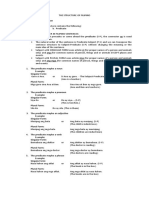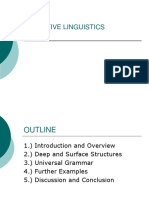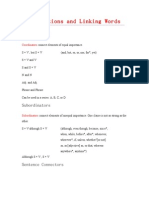Grammatical Category
Grammatical Category
Uploaded by
adlesor_n1Copyright:
Available Formats
Grammatical Category
Grammatical Category
Uploaded by
adlesor_n1Original Description:
Copyright
Available Formats
Share this document
Did you find this document useful?
Is this content inappropriate?
Copyright:
Available Formats
Grammatical Category
Grammatical Category
Uploaded by
adlesor_n1Copyright:
Available Formats
Grammatical Category
The term "grammatical category" refers to specific properties of a word that can cause
that word and/or a related word to change in form for grammatical reasons (ensuring
agreement between words).
For example, the word "boy" is a noun. Nouns hae a grammatical category called
"number". The alues of number are singular (one) and plural (two or more).
1. The boy is playing.
2. The boys are playing.
!n sentence ", "boy" is in its basic form, giing its "number" the alue of singular. There
is one boy and the related auxiliary erb "to be" is in the singular form (is).
!n sentence #, the form of "boy" has changed to "boys", giing its "number" the alue of
plural. There is more than one boy and the related "to be" is in the plural form (are).
!n the aboe example, the "number" of "boy" influences the form of boy, and also
influences the form of a related word (be). "Number" is a "grammatical category".
$nglish has oer twenty grammatical categories. %elow we list the most common ones
for $nglish learners and summarise their main features.
Number
Number is a property of nouns and pronouns, and indicates &uantity. Number has two
alues'
singular' indicates one only
plural' indicates two or more
number
singular plural
noun boy boys
pronoun ! we
Case
(ase is a property of pronouns and nouns, and expresses their relationship to the rest of
the sentence. (ase has three alues (two of which do not apply to nouns)'
subjective (pronouns only)' when the word is the sub)ect
objective (pronouns only)' when the word is the ob)ect
possessive (pronouns and nouns)' when the word indicates possession
(ownership)
case
subjective objective possessive
pronoun ! me mine
noun boy boy boy*s
Gender
Natural gender is a property of pronouns, and differentiates the sexes. Natural gender has
three alues'
masculine' indicates male
feminine' indicates female
neuter' indicates eerything else
gender
masculine feminine neuter
pronoun he/him/his she/her/hers it/its
Note that +ld $nglish had "grammatical gender" where words themseles had gender.
,emnants of this are found in "natural gender", which is based on the sex of people rather
than the gender of words.
Person
-erson is a property of pronouns, and differentiates participants in a conersation. -erson
has three alues'
first person' refers to the spea.er
second person' refers to the hearer
third person' refers to all other people or things
person
1st 2nd 3rd
pronoun !/me
we/us
you he/him, she/her, it
they
Tense
Tense is a property of verbs, and most closely corresponds with location in time. Tense
has two alues'
past' indicates before now
present' indicates now (and sometimes before and after now)
tense
past present
verb was
did
had
wor.ed
ran
am
do
hae
wor.
run
Note that "future tense" is not shown here because strictly/spea.ing it is not a tense but a
structure to tal. about the future (after now).
Aspect
0spect is a property of verbs, and expresses our iew of the time structure of an actiity
or state. 0spect has three alues'
simple' the time has no structure
continuous' expresses ongoing action
perfect' expresses completed action
aspect
simple continuous perfect
verb they wor. they are wor.ing they hae wor.ed
Mood
1ood is a property of verbs, and relates to the spea.er*s feelings about the reality of what
he is saying. 1ood has three alues'
indicative' expresses simple statement of fact
imperative' expresses command
subjunctive' expresses something desired or imagined
mood
indicative imperative subjunctive
verb 2ames stood up. 3tand up4 5e insist that he stand.
!s it &uiet enough6 %e &uiet4 !t is essential that you be &uiet.
Voice
7oice is a property of transitive verbs8, and expresses the relationship of the sub)ect to
the action. 7oice has two alues'
active' the sub)ect does the action
passive' the sub)ect receies the action
oice
active passive
transitive verb The cat ate the mouse. The mouse was eaten by the cat.
8 0 transitie erb can hae a direct ob)ect.
Degree
9egree is a property of gradable adjectives and adverbs, and indicates amount. 9egree
has three alues'
positive' indicates a basic &uality
comparative' indicates a greater &uality
superlative' indicates the maximum &uality
degree
positive comparative superlative
gradable adjective happy happier the happiest
gradable adverb carefully more carefully the most carefully
You might also like
- 3.english Lesson Plan (Jss1-3 - Ss1-3)Document3 pages3.english Lesson Plan (Jss1-3 - Ss1-3)moses60% (5)
- English Semantic: Semantic Relation Among WordsDocument19 pagesEnglish Semantic: Semantic Relation Among WordsLogi Cheminot100% (1)
- MorphologyDocument30 pagesMorphologyAnu Shrre100% (1)
- Traditional and Modern Approaches To SyntaxDocument55 pagesTraditional and Modern Approaches To Syntaxmardeflo87% (15)
- Semantics and Pragmatics EXAM QuestionsDocument2 pagesSemantics and Pragmatics EXAM QuestionsKatarzyna Badura83% (6)
- CompoundingDocument4 pagesCompoundingLiljana DimeskaNo ratings yet
- Syllable and Phonotactic ConstraintsDocument7 pagesSyllable and Phonotactic ConstraintsMuhammad Babar QureshiNo ratings yet
- Non Action VerbsDocument2 pagesNon Action Verbsadlesor_n1100% (1)
- The Structure of FilipinoDocument3 pagesThe Structure of FilipinoLove Batoon100% (1)
- Grammatical CategoriesDocument6 pagesGrammatical CategoriesBeverlyNo ratings yet
- Gramatical CategoryDocument10 pagesGramatical CategoryAna Karem Kashmir DelgadoNo ratings yet
- Introduction To SyntaxDocument12 pagesIntroduction To SyntaxAmir SohailNo ratings yet
- Semantic TheoriesDocument6 pagesSemantic TheoriesPatience OmondiNo ratings yet
- Syntax: The Relationship Between Morphology and SyntaxDocument13 pagesSyntax: The Relationship Between Morphology and SyntaxKiana Marie Blanco100% (1)
- Semantic Assignment 1Document8 pagesSemantic Assignment 1Anggoro SasongkoNo ratings yet
- English Lexicology - Stylistic SynonymyDocument10 pagesEnglish Lexicology - Stylistic SynonymyAbdel Malek100% (1)
- Lecture Notes Semantics and Grammar - CategoriesDocument4 pagesLecture Notes Semantics and Grammar - CategoriesDianaUtNo ratings yet
- SEMANTICSDocument95 pagesSEMANTICSAPRIL ROJONo ratings yet
- Theory of SemanticsDocument13 pagesTheory of SemanticsBryce Ventenilla100% (1)
- Semantics. SummaryDocument23 pagesSemantics. SummaryLuis ArevaloNo ratings yet
- Grammatical Categories of The VerbDocument26 pagesGrammatical Categories of The Verbkopanica80% (5)
- Morphology 02Document42 pagesMorphology 02jmaurpNo ratings yet
- English SyntaxDocument40 pagesEnglish Syntaxveronicka13No ratings yet
- EMP211S-2015-Morphological Typology of LanguageDocument5 pagesEMP211S-2015-Morphological Typology of LanguageHarry TapiaNo ratings yet
- Lexical RulesDocument5 pagesLexical RulesMeshu QadirNo ratings yet
- SemanticDocument3 pagesSemanticSandro CandelitaNo ratings yet
- Assigment No 2: Semantics and Discourse Analysis CODE NO 557 Q1. Sense and ReferenceDocument5 pagesAssigment No 2: Semantics and Discourse Analysis CODE NO 557 Q1. Sense and ReferencefsdfsdfasdfasdsdNo ratings yet
- Suprasegmental PhonologyDocument2 pagesSuprasegmental PhonologyValentina Candurin100% (1)
- Morphology NOTESDocument13 pagesMorphology NOTESAshfaq AslamNo ratings yet
- Morphophonemic ChangesDocument5 pagesMorphophonemic ChangesJoesoef Batjhtiar80% (5)
- Sentence Stress in EnglishDocument6 pagesSentence Stress in EnglishElvin Nobleza Palao100% (3)
- Generative LinguisticsDocument43 pagesGenerative Linguisticssarah100% (1)
- Sense RelationsDocument9 pagesSense RelationsLexyyyaNo ratings yet
- Morphology: The - Sleep - Walk - Ing - Albatross - Chant - Ed - A - Dream - y - LullabyDocument34 pagesMorphology: The - Sleep - Walk - Ing - Albatross - Chant - Ed - A - Dream - y - LullabykrostinichuNo ratings yet
- Phonology Homework 3Document8 pagesPhonology Homework 3api-279621217No ratings yet
- What Is The Relationship of Straw in Strawberry With Other Straw?Document13 pagesWhat Is The Relationship of Straw in Strawberry With Other Straw?BSUMAE201150% (2)
- Morphology - PresentationDocument20 pagesMorphology - PresentationDomingos Tolentino100% (1)
- Lexical Relations 1Document17 pagesLexical Relations 1COCONUT MUDANo ratings yet
- (Summary) SemanticsDocument4 pages(Summary) SemanticsAlex HoNo ratings yet
- Morphology Exam NotesDocument15 pagesMorphology Exam NotesAnika Reza100% (5)
- Q-The Levels of Meaning. 1-Expression Meaning 2 - Utterance Meaning 3 - Communicative MeaningDocument9 pagesQ-The Levels of Meaning. 1-Expression Meaning 2 - Utterance Meaning 3 - Communicative MeaningOmar H. Almahdawi100% (1)
- SemanticsDocument30 pagesSemanticsKZG50No ratings yet
- (Words, Sentences, and Dictionary) Introduction To English Morphology Words and Their StructureDocument2 pages(Words, Sentences, and Dictionary) Introduction To English Morphology Words and Their StructureYesiRatnaNo ratings yet
- SemanticsDocument10 pagesSemanticsummi zulaikha bt mohd nor100% (1)
- Semantics and PragmaticsDocument2 pagesSemantics and PragmaticsAnglophile123100% (1)
- Morphology Is The Branch ofDocument25 pagesMorphology Is The Branch ofMunna Hossain Khan100% (3)
- Morphology NotesDocument19 pagesMorphology Notesmuhammad faheem100% (1)
- Unit 1 (Cont.) MorphemesDocument20 pagesUnit 1 (Cont.) Morphemestrang nguyễn thị hươngNo ratings yet
- MorphologyDocument12 pagesMorphologySorayaHermawan100% (2)
- Segmental and Supra Segmental PhonologyDocument2 pagesSegmental and Supra Segmental Phonologyahdia ahmed67% (3)
- Types of MeaningsDocument3 pagesTypes of Meaningskomal ali100% (1)
- Lecture Two: Definition and Brief History of SemanticsDocument19 pagesLecture Two: Definition and Brief History of SemanticsJana Wael100% (3)
- The History of The Phoneme Theory. Schools of Phonology PDFDocument14 pagesThe History of The Phoneme Theory. Schools of Phonology PDFДиана ТатарчукNo ratings yet
- Phrase Structure RulesDocument25 pagesPhrase Structure RulesAlif Adham Arif100% (3)
- Cohesion in Discourse Analysis - Group 10Document47 pagesCohesion in Discourse Analysis - Group 10Kim Que Hoang100% (4)
- Government and Binding TheoryDocument14 pagesGovernment and Binding TheoryNoémi K. Nagyné PatakiNo ratings yet
- ModalityDocument26 pagesModalityMaria DascaluNo ratings yet
- Elements of A SentenceDocument5 pagesElements of A SentenceJay V. FernandezNo ratings yet
- Basic Ideas in SemanticsDocument13 pagesBasic Ideas in SemanticsSorayaHermawan100% (2)
- Winch 9780195529098 SCDocument37 pagesWinch 9780195529098 SCArti SrivastavaNo ratings yet
- Syntax Class HandoutDocument6 pagesSyntax Class HandoutBlue FlameNo ratings yet
- Syntax - The Analysis of Sentence StructureDocument22 pagesSyntax - The Analysis of Sentence StructureHafeed100% (1)
- The 5 Properties of VerbsDocument10 pagesThe 5 Properties of VerbsHoney Joy JuanNo ratings yet
- Small Talk Questions 1-8: 1. If You Weren't Working Here, What Would You Be Doing Right Now? 2. 3. 4. 5. 6. 7. 8Document1 pageSmall Talk Questions 1-8: 1. If You Weren't Working Here, What Would You Be Doing Right Now? 2. 3. 4. 5. 6. 7. 8adlesor_n1No ratings yet
- Free Talk - Accidents at HomeDocument2 pagesFree Talk - Accidents at Homeadlesor_n1No ratings yet
- Lesson 3 - Numbers 1-10Document1 pageLesson 3 - Numbers 1-10adlesor_n1No ratings yet
- TravelDocument4 pagesTraveladlesor_n1No ratings yet
- Free Talk PracticeDocument2 pagesFree Talk Practiceadlesor_n1No ratings yet
- Everyday VsDocument1 pageEveryday Vsadlesor_n1No ratings yet
- Lesson 2 - Foods-1Document1 pageLesson 2 - Foods-1adlesor_n1No ratings yet
- Free Talk - HolidaysDocument4 pagesFree Talk - Holidaysadlesor_n1No ratings yet
- Adverbs Are Used To Describe ActionsDocument2 pagesAdverbs Are Used To Describe Actionsadlesor_n1No ratings yet
- October 15, 2018Document3 pagesOctober 15, 2018adlesor_n1No ratings yet
- Describe Various Emotions You Have Felt in The PastDocument4 pagesDescribe Various Emotions You Have Felt in The Pastadlesor_n1No ratings yet
- Talk About Making Kimchi at HomeDocument3 pagesTalk About Making Kimchi at Homeadlesor_n1No ratings yet
- Talk About Having A Crush On SomeoneDocument3 pagesTalk About Having A Crush On Someoneadlesor_n1No ratings yet
- WH - Questions: Wh-Questions Allow A Speaker To Find Out More Information About Topics. They Are AsDocument3 pagesWH - Questions: Wh-Questions Allow A Speaker To Find Out More Information About Topics. They Are Asadlesor_n1No ratings yet
- This, That, These, Those: ExampleDocument2 pagesThis, That, These, Those: Exampleadlesor_n1No ratings yet
- PronounsDocument3 pagesPronounsadlesor_n1No ratings yet
- Simple Present TenseDocument4 pagesSimple Present Tenseadlesor_n1No ratings yet
- Prepositions of LocationDocument2 pagesPrepositions of Locationadlesor_n1No ratings yet
- Basic Sentence StructureDocument3 pagesBasic Sentence Structureadlesor_n1No ratings yet
- Frequency Adverbs: The Most Common Frequency Adverbs in English AreDocument2 pagesFrequency Adverbs: The Most Common Frequency Adverbs in English Areadlesor_n1No ratings yet
- Adjectives Are Used To Describe NounsDocument2 pagesAdjectives Are Used To Describe Nounsadlesor_n1No ratings yet
- Conjunctions and Linking WordsDocument3 pagesConjunctions and Linking Wordsadlesor_n1No ratings yet
- Adverbs and PrepositionsDocument1 pageAdverbs and Prepositionsadlesor_n1No ratings yet
- Talking About Your Opinions and Beliefs in EnglishDocument3 pagesTalking About Your Opinions and Beliefs in Englishadlesor_n1No ratings yet
- Numeral Adjectives - EducationtopiaDocument1 pageNumeral Adjectives - Educationtopiamuhammad guntur0% (1)
- KD 3.1 Personal Information 1&2Document16 pagesKD 3.1 Personal Information 1&2khoirunnisaNo ratings yet
- Nouns and PronounsDocument24 pagesNouns and PronounsRoy JarlegoNo ratings yet
- LECTURE 08 Back-Formation and ConversionDocument3 pagesLECTURE 08 Back-Formation and ConversionEliane MasonNo ratings yet
- Adjectivul in EnglezaDocument26 pagesAdjectivul in EnglezaolganegruNo ratings yet
- NHA2 - Clauses 2Document27 pagesNHA2 - Clauses 208AV2DNo ratings yet
- Gerunds and InfinitivesDocument17 pagesGerunds and InfinitivesAlejandraVasquezHoyos100% (3)
- 3rd Grade Grammar GuideDocument23 pages3rd Grade Grammar Guideapi-340575766No ratings yet
- TKT Kal Sample PaperDocument16 pagesTKT Kal Sample Papertariq_nuri83% (6)
- Reported SpeechDocument14 pagesReported Speechnotmiri01No ratings yet
- Day 1 GrammarDocument6 pagesDay 1 GrammarJames DSNo ratings yet
- Task 1 - Pre-Knowledge Quiz INGLES 4Document5 pagesTask 1 - Pre-Knowledge Quiz INGLES 4AlexandraNo ratings yet
- Nouns, Verbs, Adverbs, Adjectives and Prepositions Practice Worksheet With AnswersDocument2 pagesNouns, Verbs, Adverbs, Adjectives and Prepositions Practice Worksheet With AnswersSafia Haroon Rasheed0% (1)
- Notes On Koine Greek, Pt. 38Document1 pageNotes On Koine Greek, Pt. 38pisteuomenNo ratings yet
- PrepositionDocument40 pagesPrepositionDiwa TamaNo ratings yet
- The Adverbial Modifier and The ObjectDocument12 pagesThe Adverbial Modifier and The ObjectCsilla MoldovanNo ratings yet
- Eng 4 Q2 - wk4Document10 pagesEng 4 Q2 - wk4Jd Jamolod PelovelloNo ratings yet
- Am Not - Is Not - Are Not Am - Is - AreDocument3 pagesAm Not - Is Not - Are Not Am - Is - ArePaula Vianne Pardo100% (3)
- Manu Vatika Sr. Sec School, C.B.S.E Budhlada: RD NDDocument4 pagesManu Vatika Sr. Sec School, C.B.S.E Budhlada: RD NDmanu trivediNo ratings yet
- Differences in American and British English GrammarDocument7 pagesDifferences in American and British English Grammarjasmina2869No ratings yet
- Clause: Extra Element + Independent Clause Dependent ClauseDocument1 pageClause: Extra Element + Independent Clause Dependent ClauseTieng HuangNo ratings yet
- Speed Up Your GermanDocument236 pagesSpeed Up Your GermanArdian Fetahu100% (6)
- Royer Grammar and Punctuation Chapter 2Document9 pagesRoyer Grammar and Punctuation Chapter 2Trixie Reyes TysonNo ratings yet
- Speakout Advanced - GrammarDocument11 pagesSpeakout Advanced - Grammaraleksandra davtianiNo ratings yet
- Decriptive Text Definition of Descriptive TextDocument1 pageDecriptive Text Definition of Descriptive TextAndromeda kenNo ratings yet
- Pragmatics - Deixis and Distance by DR - ShadiaDocument24 pagesPragmatics - Deixis and Distance by DR - ShadiaDr. Shadia100% (4)
- 6 Thgrade 4 Thgrade EQTSTUDYGUIDEDocument21 pages6 Thgrade 4 Thgrade EQTSTUDYGUIDElilwavy kingNo ratings yet
- Japanese Words 2Document8 pagesJapanese Words 2lotsauploadz100% (1)


















































































































